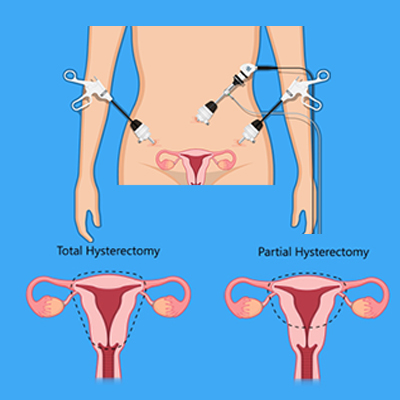hysterectomy surgery in anantapur
Hysterectomy refers to the surgical procedure aimed at removing the uterus by Hysterectomy surgery specialist in Anantapur. Following this operation, individuals will no longer experience menstruation or have the ability to conceive. The removal of the uterus is frequently employed as a treatment for various conditions impacting a woman's reproductive system. As a result of the procedure, menstruation ceases, and pregnancy becomes impossible. However, the ovaries may continue to produce hormones, which means that other menopausal symptoms may not be present. It is possible to experience hot flashes, a common symptom of menopause, due to the surgery potentially obstructing blood flow to the ovaries.
What happens during hysterectomy?
In a total Hysterectomy Surgery in Anantapur, both the uterus and the cervix are excised. This procedure is generally favored over a subtotal hysterectomy, as the removal of the cervix eliminates the possibility of developing cervical cancer in the future. In cases of partial hysterectomy, residual uterine lining may remain in the cervix, potentially leading to light menstrual bleeding for up to a year post-surgery. Following a complete hysterectomy, menstruation will cease entirely; however, patients may still experience bloating or symptoms reminiscent of menstruation.

Considerations during hysterectomy
The impact of hysterectomy on a woman's sexual life varies from person to person. It is important for women to understand that a reduction in libido and the intensity of orgasms may occur following a hysterectomy, particularly in the case of a total hysterectomy. These changes may stem from nerve damage or alterations in vaginal anatomy, which can lead to modified sensations or the absence of uterine contractions, potentially resulting in difficulties achieving orgasm or changes in the experience of orgasm itself. Conversely, women who have experienced significant menstrual symptoms may discover that their sexual life improves post-hysterectomy.
Constipation after a hysterectomy has been documented even at Best gynecologist hospital in Anantapur, potentially due to nerve damage. Women who have experienced a hysterectomy often have a longer recovery period compared to those who have had other significant surgical procedures. Associated symptoms by Best Gynecologist in Anantapur, Dr. G. P Sandhya Reddy may include urinary difficulties, fatigue, and depression. Hence it is advisable that women consider this option only after proper knowledge of her own medical condition and in consultation with the gynecologist, life partner and the extended family in consultation.
